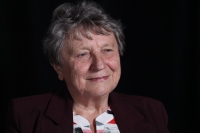We were threatened that my father would not return and we would be sent to the borderlands
Download image
Inka Tichá, née Roušarová, was born on May 17, 1943 in Polička. She lived with her parents and brother Vladimír in the nearby village of Oldřiš, where the family had a medium-sized farm. Father Vladimír Roušar was born in 1914. Mother Marta Roušarová, née Kučerová, was born in 1911. Father and mother came from agricultural families and evangelical faith played an important role in their lives. They also sang in a church choir. Roušar’s were doing well in agriculture, cows showed high yield, the family bred hens - the Czech golden spotted sort - and sold their eggs for hatching. In the fields mainly potatoes and flax were grown. Thanks to having the profitable farm, they were able to modernize it continuously. However, after the communist coup, an effort to collectivize agriculture was also made in Oldřiš, which the witness’s father opposed vigorously. Thanks to his skilfulness, hard work and knowledge, he was able to fulfil the high contributions. The Communists tried to make every possible and impossible effort to persuade him to join the collective farm. At first, he was offered the position of chairman of the cooperative, after his refusal the authorities tightened up and made life uncomfortable for the family in every possible way. A forced lease was imposed on a low fertility field lying fallow so that her father would not be able to fulfil the contributions. Vladimír Roušar was arrested in 1953. He was held in custody for a month and then released on parole. All the time, her mother did not know where he was kept. Plainclothes officers of the National Security Corps threatened her that he would not come back and she would be sent to the borderland with the children. Mother could not endure the great mental and physical pressure and broke down, which resulted in health problems for the rest of her life. Father eventually ended up in prison in Chrudim for six weeks after failing to meet the required contributions in time. Father did not join the collective farm until the 1960s. Inka Tichá graduated from the secondary agricultural school in Chrudim and worked as a zootechnician. In 1963 she got married, moved to the village of Nedvězí and brought up three children. After the Velvet Revolution, her son Jiří got back to the family tradition and runs a farm at his mother and grandfather’s birthplace. In 2020, Inka Tichá was living in Nedvězí.
